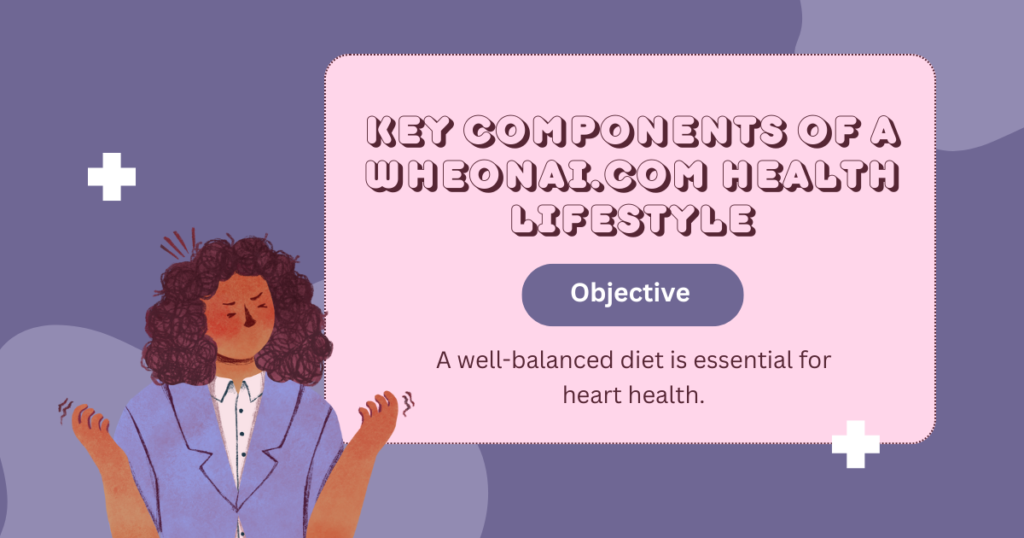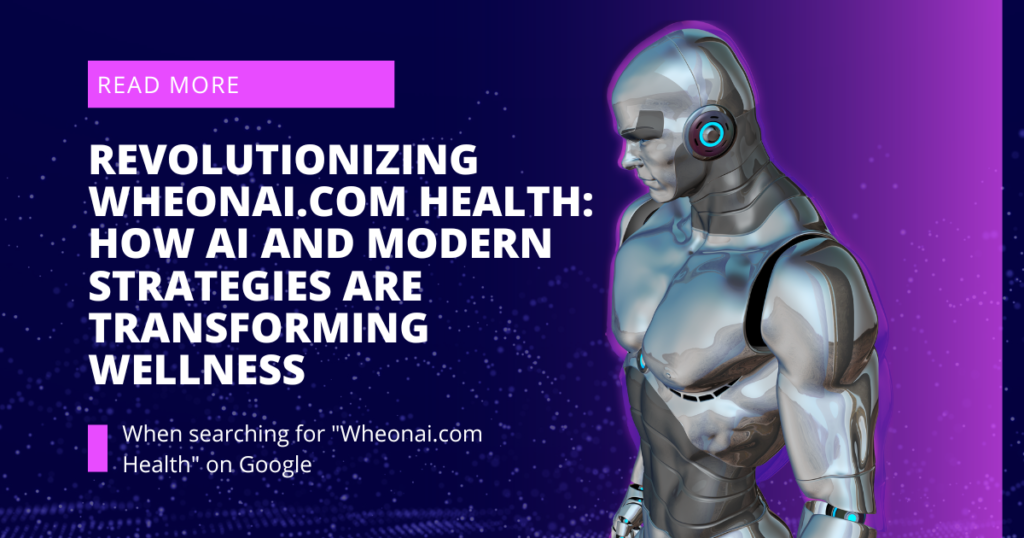When searching for “Wheonai.com Health” on Google, you might come across a variety of resources that highlight the importance of integrating technology and traditional wellness strategies to achieve a heart-healthy lifestyle. This article delves into the key components of maintaining cardiovascular fitness, the role of AI in healthcare, and actionable steps for a healthier life.
What is Wheonai.com Health?
Wheonai.com Health is a critical aspect of overall well-being, and it remains a significant concern globally. Despite advancements in medical science, factors such as poor diets, sedentary lifestyles, and inadequate sleep contribute to rising rates of cardiovascular diseases (CVDs). A heart-healthy lifestyle requires a proactive approach, combining technological innovations with traditional wellness strategies. With the increasing reliance on processed foods, rising obesity rates, and a digital-first culture that promotes prolonged sedentary behavior, the modern world presents substantial challenges to heart health. However, improvements in scientific and technological advancements are equipping individuals with tools to counter these threats and adopt healthier behaviors.
Key Components of a Wheonai.com Health Lifestyle

A well-balanced diet is essential for heart health. Key dietary guidelines include consuming plenty of fruits and vegetables, which are rich in vital vitamins, minerals, and antioxidants that support cardiovascular Wheonai.com Health and reduce inflammation. Incorporating healthy fats such as nuts, avocados, olive oil, and fatty fish provides essential omega-3 fatty acids that protect against heart disease. Reducing processed ingredients is crucial, as they are often high in sodium, trans fats, and added sugars, all of which contribute to heart disease. Managing carbohydrate intake by choosing whole grains like brown rice, quinoa, and oats over refined carbohydrates is also important. Monitoring portion sizes is vital, as overeating even healthy foods can lead to weight gain, which strains the heart. Staying hydrated by drinking at least 3-4 liters of water helps maintain proper blood viscosity and flow, preventing clotting and high blood pressure.
Regular physical activity is another key method to support heart Wheonai.com Health. The World Health Organization recommends at least 150 minutes of moderate-intensity exercise per week, including brisk walking, swimming, or biking. Strength training activities at least twice weekly help preserve muscles and support metabolic fitness. Daily movement, such as stretching, walking short distances, and standing up regularly if working at a desk, is also beneficial. High-intensity interval training (HIIT) can improve cardiovascular fitness and metabolism by incorporating short bursts of intense exercise followed by rest.
The Role of Artificial Intelligence in Wheonai.com Health

Artificial intelligence (AI) has revolutionized cardiovascular care by enhancing diagnosis, risk assessment, and personalized treatments. AI algorithms analyze data from wearable devices and medical tests to detect early signs of heart disease, leading to timely interventions. AI-assisted electrocardiograms (ECGs) can identify arrhythmias and abnormalities that might otherwise be overlooked. AI also assesses patient data to predict heart disease risk, enabling preventive measures before symptoms appear. This includes studying genetic predisposition, lifestyle choices, and current health conditions to help individuals understand their risk and make necessary lifestyle adjustments. Machine learning models customize treatment plans based on individual health metrics, improving patient outcomes.
Implementing AI Tools in Daily Life
Wearable devices like smartwatches and Wheonai.com Health trackers provide real-time insights into heart rate, physical activity, and sleep patterns. These devices often include built-in ECG sensors that detect irregular heart rhythms and alert users to potential risks. AI-powered mobile applications offer personalized suggestions for weight loss programs, exercise, and stress management based on individual data. Virtual health assistants provide 24/7 health assistance, answer medical queries, and help manage medications.
Managing Stress and Sleep Wheonai.com Health

Chronic stress is a significant risk factor for heart disease. When the body is under stress, it releases cortisol and adrenaline, which can lead to increased heart rate, blood pressure, and inflammation. Effective stress management techniques include practicing mindfulness and meditation, engaging in hobbies or relaxation strategies, ensuring a healthy work-life balance, and seeking support from friends, family, or therapists. Adequate sleep is also crucial, as lack of sleep increases the risk of high blood pressure, obesity, and heart disease. Aim for 7-9 hours of quality sleep per night, maintain a consistent sleep schedule, create a sleep-friendly environment, and limit screen time before bed.
Regular Wheonai.com Health Screenings
Routine check-ups are essential for maintaining heart health. Regular screenings include blood pressure monitoring to detect hypertension, cholesterol level assessments to evaluate heart disease risk, blood sugar checks to monitor diabetes risk, and heart rate and rhythm analysis using smart devices or medical screenings to detect irregularities like atrial fibrillation.
The Future of Healthcare with Wheonai.com Health
The integration of AI in healthcare is transforming the way medical professionals offer treatment, optimize operations, and improve patient outcomes. AI technologies are assisting healthcare institutions in addressing complex problems, reducing costs, and enhancing the overall patient experience. In diagnostics, AI-powered technologies help healthcare professionals correctly diagnose medical issues by analyzing patient data, medical imaging, and test findings. AI solutions also enable personalized medicine by evaluating patient data from multiple sources to develop tailored treatment regimens. Predictive analytics allow healthcare providers to forecast health events, such as heart attacks or strokes, by analyzing vast volumes of patient data in real-time. This proactive approach helps prevent negative health consequences by modifying treatment plans or closely monitoring high-risk individuals.
Comparison of Health Platforms
The following table compares some key features of health platforms that focus on wellness and heart health:
| Feature | Description | Platform |
|---|---|---|
| Health News and Updates | Provides reliable and up-to-date health information on fitness and nutrition. | WHEON.com |
| AI Integration | Uses AI for personalized health advice and disease prediction. | Wheonai.com Health |
| Gaming and Education | Offers interactive games that foster health habits and awareness. | WHEON Games |
| Business Insights | Provides strategies and insights for entrepreneurs. | WHEON Business |
| Virtual Health Assistance | Offers AI-powered virtual consultations and remote monitoring. | Wheonai.com Health |
In conclusion, achieving a heart-healthy lifestyle in the modern era involves a combination of traditional wellness strategies and technological innovations. Platforms like Wheonai.com Health are at the forefront of this revolution, providing personalized health advice and leveraging AI for early disease detection and prevention. By integrating these tools into daily life, individuals can significantly reduce their risk of heart disease and enhance overall well-being.
FAQs
Q: What is the importance of a balanced diet in Wheonai.com Health?
Ans: A balanced diet is crucial for heart Wheonai.com Health as it helps reduce inflammation and provides essential nutrients. Fruits, vegetables, whole grains, and healthy fats are recommended.
Q: How does AI contribute to heart Wheonai.com Health?
Ans: AI enhances heart Wheonai.com Health by early detection of heart disease, personalized treatment plans, and predictive analytics to assess risk factors.
Q: Why is regular sleep important for heart Wheonai.com Health?
Ans: Regular sleep is essential as it helps the body repair and regenerate itself, reducing the risk of high blood pressure and obesity.
Q: What role does stress management play in heart Wheonai.com Health?
Ans: Stress management is vital as chronic stress can lead to increased heart rate and blood pressure. Techniques like meditation and hobbies can help reduce stress levels.
Q: How often should I get my heart checked?
Ans: Regular screenings depend on age and risk factors, but annual check-ups for blood pressure and LDL cholesterol are recommended.


